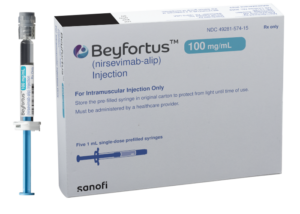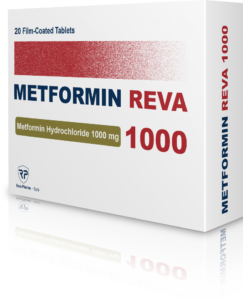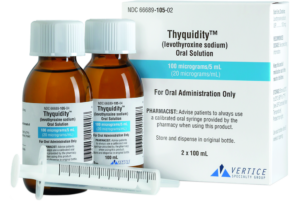Beyfortus
Beyfortus is the first monoclonal antibody approved to protect all infants through their first RSV season, Beyfortus Generic name nirsevimab-alip is a long-acting monoclonal antibody with activity against the respiratory syncytial virus (RSV) that may be used to protect neonates and infants born during or entering their first RSV season against RSV-caused lower respiratory tract infections and for children up to 24 months of age who remain vulnerable to severe RSV disease through their second RSV season.
 Beyfortus works by attaching to a protein called F protein on the surface of the virus. When the drug is attached to this protein, the virus becomes unable to enter the body’s cells, The active ingredient in Beyfortus is nirsevimab which is a long-acting monoclonal antibody that provides passive immunization against RSV to neonates and infants born during or entering their first RSV season and to infants with congenital heart disease or chronic lung disease entering their first or second RSV season. It was approved by FDA on July 17, 2023. Beyfortus has been available in the European Union since 31 October 2022.
Beyfortus works by attaching to a protein called F protein on the surface of the virus. When the drug is attached to this protein, the virus becomes unable to enter the body’s cells, The active ingredient in Beyfortus is nirsevimab which is a long-acting monoclonal antibody that provides passive immunization against RSV to neonates and infants born during or entering their first RSV season and to infants with congenital heart disease or chronic lung disease entering their first or second RSV season. It was approved by FDA on July 17, 2023. Beyfortus has been available in the European Union since 31 October 2022.
Beyfortus Dosage and Administration
Beyfortus should be administered prior to commencement of the RSV season, or from birth for infants born during the RSV season. Beyfortus is for intramuscular injection only. It is administered intramuscularly, preferably in the anterolateral aspect of the thigh. The gluteal muscle should not be used routinely as an injection site because of the risk of damage to the sciatic nerve.
The dose is either 0.5mL or 1mL depending on the infant’s body weight.
- Recommended Dose for body weight less then 5kg is 50mg given IM using a 0.5mL prefilled syringe.
- Recommended Dose for body weight more then 5kg is 100mg given IM using a 1mL prefilled syringe.
A single dose should be given before the start of the RSV season, or from birth for infants born during the RSV season. There is limited data available for the use of Beyfortus in extremely preterm infants who are less than 2 month of age.
For infants undergoing cardiac surgery with cardiopulmonary bypass, an additional dose may be administered once the infant is stabilized after surgery, depending on the length of time passed:
- For less then 90 days of the first dose, administer 50mg or 100mg depending on body weight
- For 90 days or more since the first dose, administer a single dose of 50mg regardless of body weight.
Beyfortus Side Effects
Beyfortus is generally well tolerated, and the most common side effects reported include a mild-to-moderate rash in rare cases. Other side effects that are not reported in more then 0.5 % of infants within 7 days post dose include fever and non-serious injection site reactions. Call you doctor if your child develops signs of an allergic reaction to Beyfortus, symptoms include hives, difficulty breathing, swelling of the face, lips, tongue, or throat.
Medarchive.us does not assume any responsibility for any aspect of healthcare administered with the aid of materials provided. The information contained herein is not intended to cover all possible uses, directions, precautions, warnings, drug interactions, allergic reactions, or adverse effects. The information provided on our Web or Videos does not endorse drugs, diagnose patients, or recommend therapy. If you have questions about the medication you are taking or want to start as treatment, check with your doctor or medical health care provider.







